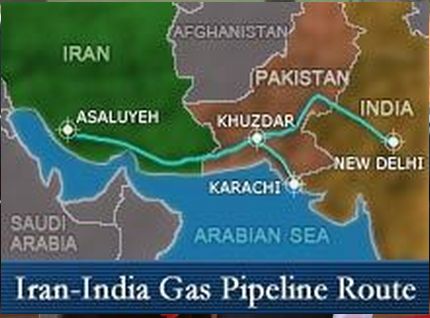
The India-Pakistan-Iran pipeline project is facing serious hurdles including pricing and fierce opposition of the U.S. government for some times. For India, Iran, world’s second largest oil and gas proven reserves, is a big market and an important access route to Central Asia and Afghanistan.
In the wake of growing economy, India is desperately looking for new routes to reach to the markets of Central Asian region. The North-South Corridor is one of those possible routes that links India to Russia and the other state of former Soviet Union through the Persian Gulf, Iran and Caspian Sea.
At the same time, Iran has raised its voice against the hegemonic presence of the United States in the Indian Ocean. According to the report, India has also played the Iran card to draw major concessions from the US on different matters of bilateral concern. So, this is being said that the trio nations’ relations with the US have put the highly remarkable IPI project in the back burner.
The proposed Iran-Pakistan-India Pipeline (IPI) would cover a total 2,670 km of which about 1,115 km would be in Iran, 705 km in Pakistan and 850 km in India. The project would need total investment of $7 billion and it will take four to five years to complete. The smooth running of the IPI project would also depend on the bilateral relations between India and Pakistan and the on-going peace process between both neighboring countries.
According to some political experts, the IPI project will be proved as the mother of all confidence-building measures between these two neighboring countries. They have even called the IPI project as the ‘Peace Pipeline’.
The project has been delayed because both the countries had rejected the final agreement circulated by Iran regarding a three-year review cycle on the gas price by Iran. Now, it has caused yet another delay in the IPI deal. A new round of negotiations between the trio nations will solve the pricing controversy. If they failed to do so, the project will turn into an unbridgeable difference and the fate of IPI project would go under question marks for sure.
The U.S. concerns over the IPI project is not linked to the economic side of the deal but to Washington’s Iran policy. The US has had not good relations with Iran since the 1979 revolution. In past some years, the US administration has been accusing Iran for carrying nuclear-weapon ambitions.
India has come under greater pressure because of the development of bilateral relations with US. The Indo-US nuclear deal, which gives India’s nuclear capability a legitimacy, the first one outside the Non-Proliferation Treaty, may force India to come out of the Iran pipeline deal.
The IPI is being perceived as running against this broad strategic American perspective where India is being emerged as an ally to counter China’s rising power and Iran regional importance.
The IPI is now facing all kinds of hurdles like internal, regional, and international. The absence of good inter-relations among the trio nations, absence of an OPEC-type pricing mechanism and the interests of US in the region are some of the biggest hurdle coming in the way of the IPI project.
However, the fact of the matter is that regional pipelines actually contribute to the sustainable growth and stability of the linked regions. The IPI project will do the same for the three countries involved in the project for sure.




